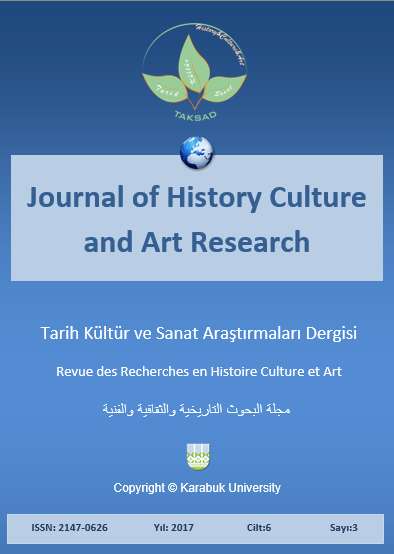Evaluating the Relation between Personality Properties with Job Satisfaction of the Staff
DOI:
https://doi.org/10.7596/taksad.v6i3.964Anahtar Kelimeler:
Job satisfaction- Extroversion personality- Introversion personality- Organizational behavior.Özet
In any organization, any individual’s organizational role should be coordinated with his individual personality in order for the individual behavior to be coordinated with organizational behavior and in order for the organization’s life not to be disturbed in the case of lack of authenticity between individual personality with organizational role so that the members of organization may get in to trouble influenced by such a conflict and be inevitable before the organization. The aim of this research is evaluating the relation between personality properties with job satisfaction of the staff. The current research method is descriptive correlation. Statistical society of the present research were all staff of a governmental organization in Tehran city. Research sample was 80 people who were chosen through random sampling. Finally, in order for analysis of the data, SPSS software was used. The results of this research showed that there was a significant relation and positive correlation between introversion personality type with the extent of job satisfaction and also there was a negative and significant relation between two variables of extroversion personality type with job satisfaction. On the other hand, considering personality dimensions of the individuals in the organization is among the categories that has an efficient role in progress and health improvement of workforce.
Referanslar
Aghili Negad, M., Nasiri Kashani, M. H., Bahrami Ahmadi, A., Shams Poor, M., Shams Poor, N. & Mokamel Kahah, E. (2014). Evaluation of Relationship between Job Satisfaction and Personality Characters among Relief Workers of Tehran City; Occupational Medicine Quarterly Journal; 7(4): 82-87.
Allen, J. & Mellor, D. (2002). Work Context, Personal Control and Burnout amongst Nurses. Western Journal of Nursing Research, 24(8), 905-917.
Bakker, A. B., Van Der Zee, K. I., Lewig, K. A. & Dollard, M. F. (2006). The Relationship between the Big Five Personality Factors and Burnout: A Study among Volunteer Counselors. The Journal of social psychology, 146(1), 31-50.
Connolly, J. J. & Viswesvaran, C. (2000). The Role of Affectivity in Job Satisfaction: A Meta-Analysis. Personality and Individual Differences, 29(2), 265-281.
Dastoorani, M. & Poor Yoosef, S. (2012). Evaluating the Relation between Personality Features and Mental Health with Job Satisfaction of the Staffs; Inspection Quarterly, 6(2): 109-134
Davis, K. & Newstrom, J. (1995). Organization Behavior. Mc. Grawhill Inc.
Fabra, M. E. & Camisón, C. (2009). Direct and Indirect Effects of Education on Job Satisfaction: A Structural Equation Model for the Spanish Case. Economics of Education Review, 28(5), 600-610.
Goshtasb, M. (2005). The Effects of Plan Implementation of the Physicians on the Job Satisfaction and Physicians’ Performance. Master's Thesis of Governmental Management, Tehran: Tarbiat Modaress University.
John, O. P. & Srivastava, S. (1999). The Big Five Trait Taxonomy: History, Measurement, and Theoretical Perspectives. Handbook of Personality: Theory and Research, 2(1999), 102-138.
Majidi, I. (2001). Effective Factors on Job Satisfaction. Disciplinary Science Quarterly, 3(1).
Mamen Poosh, M. (2009). Evaluating The Relation Between (Extroverted-Introverted) Personality Type with Job Satisfaction and Organizational Commitment of the Staffs of Isfahan Steel Company, paper, Raskhoon site.
McCrae, R. R., Costa, J. P. T. & Martin, T. A. (2005). The NEO–PI–3: A More Readable Revised NEO Personality Inventory. Journal of Personality Assessment. 2005; 84(3):261-70.
Mirzayee, G. R. (2006). Effective Factors on the Job Satisfaction of Officers in a Military Unit. Journal of Military Medicine, 8(1): 69-77.
Moghimi, S. M. (1998). Organization and Management, Management Approach. Tehran: Terme publication.
Mohammadi, G. (2010). Evaluating the Relation between Personality Features and Emotional Intelligence with Identity Types of Third Grade Middle School Female Students of Tabriz City in the Academic Year of 2009-2010. Master’s thesis, Islamic Azad University of Tabriz, Faculty of psychology.
Moshabaki, A. (1998). Organizational Behavior Management of Functional Analysis, a Value of Organizational Behavior. Tehran: Terme publication.
Najjar Poor Ostadi, S., Aghdami Baher, A. & Khadivi, A. A. (2008). Evaluating Perceptual Relation of Social Inequality and Social Hypothyroidism and Job Stress with Job Satisfaction among the Staffs of Islamic Azad University, Management Science Quarterly; 2(6): 57 - 77.
Ranez, E. & Debi Setro, P. (1998). Organizational Behavior, Translated by Sayed Mohammad Omarayee, Mohammad Ali, Hamid Rafiee, Behrooz Asrari Ershad. (4th Ed). Tehran: Cultural Research Office Publication.
Roodposhti Guide, F. & Mahmoudzadeh, N. (2008). Development of Human Resources. Tehran: Industrial Management Organization Publication.
Saat Chi, M. (2007). Efficiency Psychology. Tehran: Virayesh publication.
Shafiee Abadi, A. (2007). Professional Consultation Theories and Job Selection Theories. Tehran: Roshd.
Skalli, A., Theodossiou, I. & Vasileiou, E. (2008). Jobs as Lancaster Goods: Facets of Job Satisfaction and Overall Job Satisfaction. The Journal of Socio-Economics, 37(5), 1906-1920.
Vohra, N. (2010). Influence of Positive Characteristics on Organizational Commitment and Job Satisfaction of Indian Middle Managers. Submitted to journal of psychology for publication. Availablefrom: http://www.iimcal.ac. in/res/upd% 5CWPS, 20635.
İndir
Yayınlanmış
Nasıl Atıf Yapılır
Sayı
Bölüm
Lisans
Tarih Kültür ve Sanat Araştırmaları Dergisi'nde yayımlanan tüm çalışmalar Creative Commons 4.0 CC-BY lisansı ile lisanslanmıştır.
Bunları yapmakta özgürsünüz:
- Bu eseri her boyut ve formatta paylaşabilir — kopyalayabilir ve çoğaltabilirsiniz.
- Materyalden Adapte et — karıştır, aktar ve eserin üzerine inşa et
- her türlü amaç için, ticari amaç da dahil
Alttaki şartlar altında:
Atıf — uygun bilgiyi, lisansa linki, and ve değişiklik yapıldıysa değişiklik bilgisinivermelisiniz. Sizi veya kullanımınızı lisansörün onayladığı bilgisini içermemek kaydıyla, size uygun şekilde bu işlemleri gerçekleştirebilirsiniz.
AynıLisanslaPaylaş — Eğer materyali karıştırdınızsa, aktardınızsa ya da materyalin üzerine çalıştınızsa, ancak aynı lisans ile dağıtabilirsiniz.
- Ek sınırlamalar yoktur — Lisansın izin verdiği hakları başkaları üzerinde kanunlarla ya da teknolojiyikullanarak sınırlayamazsınız.







